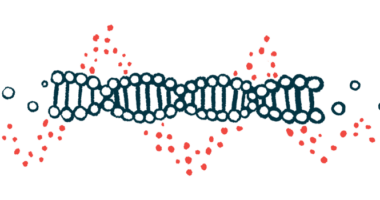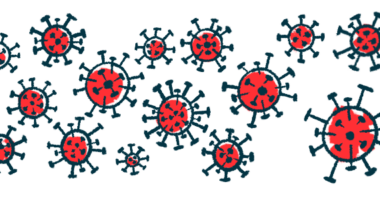Gene therapy is parents’ 1st choice to treat SMA children: Survey
But more than 50% worry about the one-time treatment 'wearing off'

Despite concerns about long-term efficacy and safety, gene therapy was the first choice treatment for most parents of children with spinal muscular atrophy (SMA), whether diagnosed via newborn genetic screening or symptoms, according to a new survey study.
However, the amount and type of information parents received upon their child’s diagnosis — and its accuracy — were inconsistent, the researchers noted, “suggesting a need for standardization” as well as a “target for improved communication.”
Moreover, at the first clinic appointment, families reported having difficulty understanding the information provided, while conversely saying the amount and timing of the information given was appropriate. The researchers recommended limiting the number of clinicians involved at the first visit, and providing summary information for families to take home.
In addition, most parents expressed feelings of anxiety and fear, which persisted for months or years beyond their child’s diagnosis, according to the study. Given these findings, “we identify the need for mental health screening and care for parents,” the researchers added.
Regardless, among parents whose child was diagnosed via newborn screening, nearly all were glad their baby had been screened and reported that it positively impacted their child’s health.
The survey study, “Parental Experiences with Newborn Screening and Gene Replacement Therapy for Spinal Muscular Atrophy,” was published in the Journal of Neuromuscular Diseases.
94% of parents with children screened as newborns glad for SMA testing
SMA is primarily caused by mutations in the SMN1 gene, which encodes the SMN protein. As a result, little or no SMN protein is made, leading to the dysfunction of motor neurons, the specialized nerve cells that control movement.
In most cases, SMA symptoms, such as muscle weakness, appear in infancy and childhood. As such, genetic screening of newborns can detect SMA before symptoms emerge, allowing early treatment with disease-modifying therapies, including the approved gene replacement therapy Zolgensma (onasemnogene abeparvovec-xioi).
Because newborn screening and gene replacement therapy are relatively new advances, “limited research exists assessing parental experiences surrounding these interventions,” according to researchers at the Nationwide Children’s Hospital, in Ohio.
To fill this gap, the team conducted interviews and online surveys with 111 parents of SMA children, diagnosed via newborn screening or symptoms, who were treated with gene replacement therapy. Both the surveys and interviews were conducted in English.
Most of the respondents were mothers (82%) and ethnically white individuals (84%), and about half had a bachelor’s or master’s degree (51%). Six parents (8%) had more than one child with SMA.
Among the 50 children (63%) diagnosed via newborn screening, fewer than half of their parents (42%) felt that the screening allowed them to understand the diagnosis. But more than half (56%) said it helped them know the next steps in their child’s healthcare. Regardless, nearly all of these parents (94%) were glad their child had been screened and reported that it positively impacted their child’s health (94%).
“Yes, I am ever so grateful that they, you know, included it on the infant screening because, in all likelihood, the fact that he got treatment as quickly as he did is why he’s doing as well as he is,” said one mother of screened child.
“And, you know, getting the diagnosis was hard, but it was crucial to making sure that my son gets to live the life that he should,” this mother added.
The researchers noted that getting the screening results left parents wanting more information — which they say highlights the need for up-to-date and accurate information to be available.
Researchers cite need for better information for parents at diagnosis
Parents of children diagnosed symptomatically wondered how their children’s lives may have been different if they had undergone newborn screening.
“There was a kid who got diagnosed on newborn screen [who] lives right down the road from us,” said the mother of one SMA patient diagnosed via symptoms.
“He wears little ankle braces, but he has hit every milestone and walks just fine. So, I, it’s hard… I just wonder what she would be like. It’s just four more months, like if I had, if I had just waited to get pregnant four more months… yeah, you think she’d be so typical if she was on the newborn screen,” the mother said in her interview.
Most parents felt hopeful after discussions with clinicians about available treatment options. While they were informed gene therapy likely would lessen their child’s symptoms, they knew it wasn’t a cure for their SMA.
Many had safety concerns, but almost all — 97%-98% — were grateful that their child received gene replacement therapy. More than half, however, worried about the treatment “wearing off” over the long term
Gene replacement therapy was the first choice for SMA treatment for parents, the survey found.
A theme of cautious hope emerged regarding parents’ views of their child’s diagnosis and future following gene replacement therapy.
“When we sat and listened to the explanation of those treatments, we said that we wanted to go home and talk about it. … But when we got home, we both immediately said, you know, the gene replacement therapy is what we want. This is a one-time thing. It’s less invasive. This is what we want to do,” one mother said.
The researchers reported that, overall, “a theme of cautious hope emerged regarding parents’ views of their child’s diagnosis and future following gene replacement therapy.”
Nearly all parents (92%-100%) said they were scared and anxious following their child’s diagnosis, and at the time of the survey, the majority (50%-86%) still expressed these emotions. Parents of children with more severe disabilities, such as an inability to sit or walk independently, needing a wheelchair, feeding support, or breathing support, were more likely to report anxiety at the time of the survey.
Nearly all parents surveyed believe their children will have ‘meaningful life’
When asked about the future, more parents in the newborn screening group thought their child would have a “normal life” compared with the symptomatic group (74% vs. 38%). Regardless of the means of diagnosis, nearly all (90%-93%) felt that their child would have a “meaningful life” and were hopeful about their children’s future.
Overall, 94%-100% of parents were happy with their child’s care, trusted their healthcare team, and understood the need for continued medical care following treatment. Most felt that the amount of information provided for the disease, testing, genetics, and treatment was appropriate.
However, regarding testing for SMA, 28% of parents in the symptomatic group said this came too late.
As expected, genetic counseling was more commonly provided in the newborn screening group than in the symptomatic group (72% vs. 59%). Most such counseling occurred following diagnosis (58%) or before gene replacement therapy (28%).
Among respondents, most (77%) felt that consulting with a genetic counselor immediately following diagnosis would be the most beneficial time. Genetic counseling helped parents understand the diagnosis and the risk for themselves or family members to be carriers of SMA.
“Utilizing this data, we provide a recommendation for the information provided in newborn screening disclosure, propose adjustments to education and counseling during the first clinic visit, and bring awareness of parents’ mental health difficulties,” the researchers concluded.










